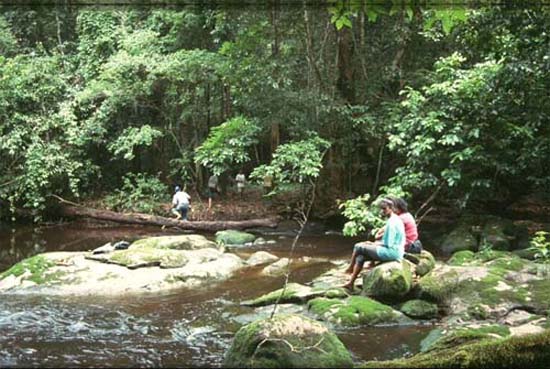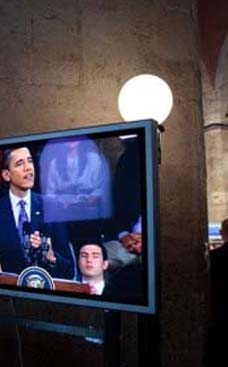
Kevin is headed back to the interior after an extended medical leave in Parbo -- two weeks ago, he became the latest PCV to contract dengue fever. His was a mild case -- he suffered none of the horrific symptoms of "breakbone fever," the "bonecrusher disease." Suriname's interior is currently being swept by a dengue epidemic for which there is no vaccine. Kevin leads me to his wagi. The driver, a boy no older than sixteen, happily shakes my hand and takes my backpack. He unties a piece of twine at the rear of the van and the back door flies open. He shoves my pack on top of a pile of bags and propane tanks and then pulls the door shut again, holding it in place with his foot as he reties the twine. "Oten wi gwe?" Kevin asks the boy. When do we go? "Dalek," says the boy.
Kevin is a Peace Corps volunteer I met a month ago at Stadszending, and he gave me a standing invitation to visit him in the Saramaka Maroon village of Balingsoela, his home for the next two years
Suriname is a refreshing change to a hurry-up world
Canadian author Andrew Westoll learns that Suriname's tendency to tarry is the least of its problems
By Andrew Westoll, Special to Canwest News Service
The Riverbones, a new book by Canadian writer Andrew Westoll, details the author's trip back to the little-known South American country of Suriname, nestled north of Brazil in the upper Amazon basin. A former Dutch colony, Suriname has the largest tract of pristine rainforest left on Earth.
The Maroons referred to in the excerpt below are descendants of African slaves who escaped into the rainforest 300 years ago.
In this excerpt Westoll leaves the city of Saramaccastraat and heads for the country's bauxite mines:
At seven o'clock on a weekday morning, Saramaccastraat is alive with nervous energy. Huckster shopkeepers stand in front of their tiny stores with fierce gazes, toothpicks poking from the corners of their mouths. Street peddlers, many of them old Maroon women with colourful hair-wraps, crouch on the sidewalk behind blankets piled with bunches of bananas and pyramids of oranges, torn pieces of cardboard advertising their prices. A giant man in a bright green T-shirt sells burned CDs from a plank of wood balanced on his belly. The Central Market has just opened and the smell of fish and the sweat of nocturnal fishermen wafts from its alleyways. Gangs of young drug dealers and gold miners and aspiring reggae singers swarm the northwest corner of Dr. Sophie Redmondstraat in a cloud of marijuana and macho bravado. A dandy in a baby blue suit and grey fedora leans on his golden cane and harasses the women who walk past, regardless of age or figure or stage of pregnancy. An army of white cargo vans, the ubiquitous wagis of Suriname, now stained red, lines both sides of the street, their owners scrubbing the bauxite dust off them in preparation for another coating of bauxite dust. And hovering near these vehicles, groups of southbound Maroons gather in the meagre shade of nearby shopfronts, jerry rigged backpacks and double-knotted plastic bags at their feet, waiting for the journey home to begin.
For the Maroons of Brokopondo and Saramaka, there is only one way to get to the city and there is only one way to return home. All of these journeys either begin or end here, on Saramaccastraat, the Grand Central Station of Suriname.
I find Kevin buying groceries in a supermarket filled with chocolate bars and booze. Kevin is a Peace Corps volunteer, a PCV, one of approximately forty young Americans working in Suriname. We first met a month ago at Stadszending, and he gave me a standing invitation to visit him in the Saramaka Maroon village of Balingsoela, his home for the next two years. Balingsoela is less than ten kilometres from the lake, the perfect base from which to explore Brokopondo.
Kevin is headed back to the interior after an extended medical leave in Parbo -- two weeks ago, he became the latest PCV to contract dengue fever. His was a mild case -- he suffered none of the horrific symptoms of "breakbone fever," the "bonecrusher disease." Suriname's interior is currently being swept by a dengue epidemic for which there is no vaccine.
Kevin leads me to his wagi. The driver, a boy no older than sixteen, happily shakes my hand and takes my backpack. He unties a piece of twine at the rear of the van and the back door flies open. He shoves my pack on top of a pile of bags and propane tanks and then pulls the door shut again, holding it in place with his foot as he reties the twine.
"Oten wi gwe?" Kevin asks the boy. When do we go? "Dalek," says the boy.
Stolen from the Dutch, the Sranantongo word dalek translates as "soon" or "in a bit." Its real meaning, though, is closer to "it'll happen when it happens." Dalek is every Surinamese's favourite response to any question concerning time. It can be a frustrating answer for a visitor to receive, especially when making appointments or travel plans, but there is a positive side to dalek as well. The word comes with a guarantee that whatever you are asking about will eventually happen, just not yet, and can be a soothing revelation to travellers in unknown countries.
Kevin smiles and turns to me. "You know about dalek?" he asks, as he pops the cap on a Parbo.
"Yeah," I say, taking the beer and breaking my fast.
Kevin sits down on the curb and fumbles for his Morellos. "I'm going to get dalek tattooed on my f------ chest."
Ninety minutes later, half of the wagis have already left for the south, but not ours. Finally, a group of Maroons emerges from a nearby shop. Without a word, the driver jumps into the truck. Kevin and I climb in the side door and settle into the back seat The wagi is designed to seat nine, but by the time the doors are finally closed there are fourteen of us squeezed in among hundreds of pounds of gear.
We pull out into the street, bottom heavy and flesh filled, and head south past flashing casino lights. We cross a small bridge, where an old Rastafarian man balances on a rocky ledge and serenades the passing traffic through an imaginary microphone. Although it feels like we're about to leave the city and begin our journey, this is an illusion. We stop at Popeye's Chicken and Biscuits so the old woman in the front seat can get her fix. We pull in at a rural grocery store, where two kids hop out and return with bags of white bread. At a construction depot that doubles as an abattoir, the driver haggles with a Hindustani man dressed in a blue, bloodstained smock; then the two of them shuffle five thirty-pound bags of cement over to the wagi. Just as I wonder where these bags are going to fit, the driver finds just enough space for them beneath my feet.
The supply run continues. We stop for six watermelons at a roadside stand. We slow for mangoes but decide against them, to Kevin's dismay. Finally, an hour after leaving Saramaccastraat, we pull in at an old tavern for a rest. The men swarm the caged-in bar while the women perspire on white plastic garden chairs. We have covered a total of ten miles, we haven't even left the city yet, and everyone is hungry and exhausted.
Soon we're back on the road. The wagi rattles over potholes on the Martin Luther King Highway as we race through the savannah belt south of the city. The cab echoes with the rustling of plastic bags as we devour trays of bami kip, the Hindustani staple of chicken and fried noodles. Soon we reach a rare intersection, where a billboard shows a tiny, defenceless car at the moment of annihilation by an enormous, barrelling dump truck. We have reached Paranam, home to Suriname's famed bauxite mines, Suralco's flagship alumina refinery, and to its now-closed aluminum smelter.
From The Riverbones: Stumbling After Eden in the Jungles of Suriname by Andrew Westoll. In stores now. Published by McClelland & Stewart Ltd. Reprinted by permission of the publisher.
THE GENESIS OF RIVERBONES
At 23, former Vancouverite Andrew Westoll spent a year studying wild troops of capuchin monkeys deep inside the jungles of Suriname. When he returned to Canada, he wrote a travel story for The Vancouver Sun about some of his adventures (Monkey Heaven in Suriname, March 1, 2003).
Now Westoll has written his first book, The Riverbones, a travel memoir based on his recent return to Suriname.
The Riverbones chronicles both the remarkable untouched areas and cultures of the country, but also the devastation being wrought there by forestry and mining -- much of it by a Canadian company.
The title refers to a massive swath of jungle that was flooded when a hydroelectric dam was built on the Suriname River. The canopy of this dead rainforest still pokes up out of the water like bones, a haunting reminder of the destruction that could occur if Suriname's vast jungles are not protected.
© Copyright (c) Canwest News Service











